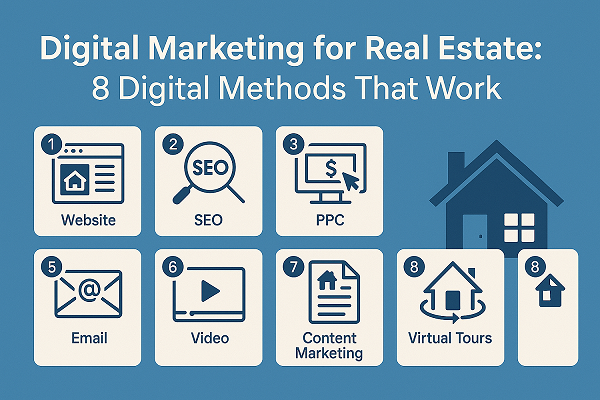In today’s competitive property market, traditional marketing techniques no longer suffice. Buyers and investors now begin their property search online, making digital marketing for real estate an essential strategy for agents, developers, and agencies. The digital landscape not only offers broader reach but also provides tools to target the right audience at the right time.
If you’re in the real estate business, leveraging online platforms effectively can significantly boost your visibility and lead generation. Here are eight proven digital methods that are reshaping real estate marketing and delivering real results.

1. Build a High-Performing Real Estate Website
Your website is your digital storefront. It should be fast, mobile-friendly, easy to navigate, and equipped with features such as property listings, virtual tours, contact forms, and blog content. A well-optimized website plays a crucial role in digital marketing for real estate by attracting organic traffic and generating quality leads. Adding SEO-focused content around local real estate trends further boosts visibility.
2. Use SEO to Rank Higher on Google
Search engine optimization (SEO) is a long-term game, but it offers sustainable results. Real estate businesses can attract potential buyers and sellers by targeting keywords like “buy a house in Dehradun” or “luxury apartments near me.” Local SEO is especially important in digital marketing for real estate, as most property searches are location-specific. Make sure your website includes optimized meta descriptions, headers, and geo-tagged images to enhance search rankings.
3. Leverage Social Media Advertising
Excellent targeting options are available on social networking sites like Facebook, Instagram, and LinkedIn. You can run paid campaigns based on demographics, interests, income levels, and even job titles. Social media is not just about selling; it’s about building trust and brand awareness. With the right strategy, social platforms become powerful tools in digital marketing for real estate, allowing you to connect with potential clients in a more engaging and personal way.
4. Create Virtual Tours and Video Walkthroughs
Modern buyers want to explore properties from the comfort of their homes. Virtual tours and video walkthroughs provide a 360-degree view of properties and are highly effective in driving interest. These visual tools are becoming a staple in digital marketing for real estate because they increase time spent on your listings and help buyers visualize their future homes. Videos can be shared on YouTube, social media, or embedded into your website for maximum exposure.
5. Run Google Ads for Targeted Reach
Google Ads allows you to appear at the top of search results when potential clients look for real estate in your area. This form of pay-per-click (PPC) advertising is great for targeting high-intent buyers and sellers. When done right, Google Ads can generate quick leads and complement your long-term SEO efforts. Incorporating Google Ads into your digital marketing for real estate strategy ensures consistent online visibility, especially in competitive markets.

6. Start an Email Marketing Campaign
Email marketing is still one of the most economical methods for nurturing prospects. Create segmented email lists based on client interests—such as first-time buyers, luxury property seekers, or commercial investors—and send them personalized content. Sharing market insights, new listings, or investment tips keeps your audience engaged. A strong email strategy is essential in digital marketing for real estate, helping to maintain long-term relationships and drive repeat business.
7. List on High-Traffic Real Estate Portals
Platforms like 99acres, MagicBricks, and Housing.com are popular in India for property searches. These portals have massive daily traffic and trusted user bases. By listing your properties here and optimizing your profile, you increase visibility and credibility. Integrating your presence on these platforms with your overall digital marketing for real estate plan creates a multi-channel funnel that improves your chances of getting quality inquiries.
8. Use Retargeting to Re-Engage Visitors
Many visitors will check out your property listings or website and leave without taking action. With retargeting, you can re-engage them with customized advertisements on sites like Google Display Network and Facebook. These ads remind users of what they were interested in and often result in higher conversion rates. Including retargeting in your digital marketing for real estate toolkit helps you stay top of mind among potential buyers.
Final Thoughts
In a dynamic industry like real estate, adapting to the digital era is no longer optional—it’s essential. The strategies outlined above offer a roadmap to improving your online presence, reaching the right audience, and converting interest into actual sales.
Digital marketing for real estate is all about leveraging the right mix of platforms and tactics to showcase your properties and services in the best light. Whether you’re a seasoned agent or a new developer, embracing digital tools can take your business to the next level.
By focusing on long-term growth and customer engagement, digital marketing for real estate not only helps you attract new clients but also builds a strong brand that stands the test of time.
